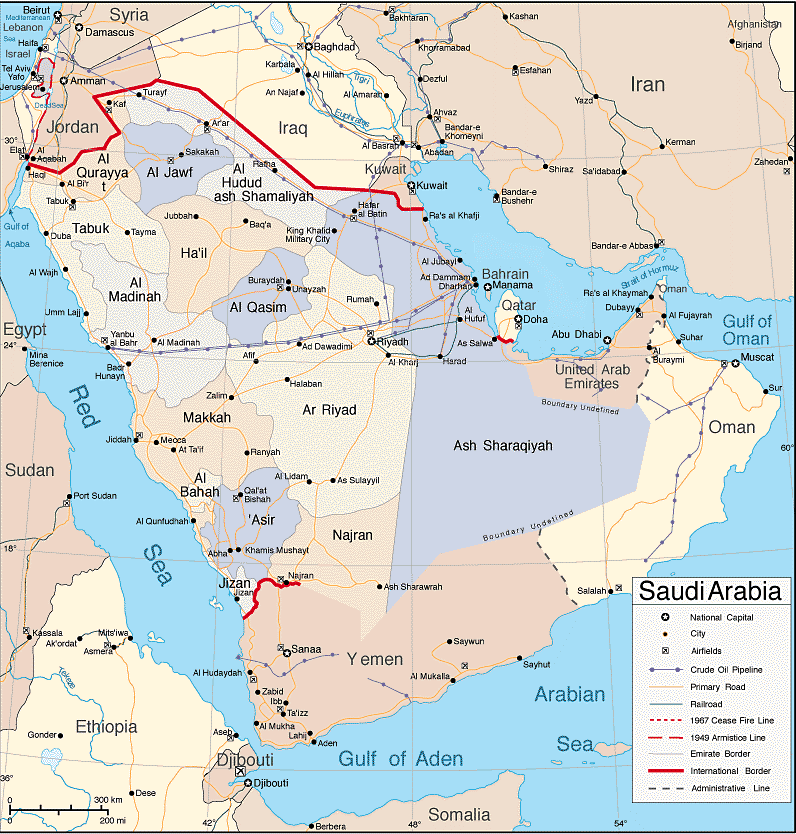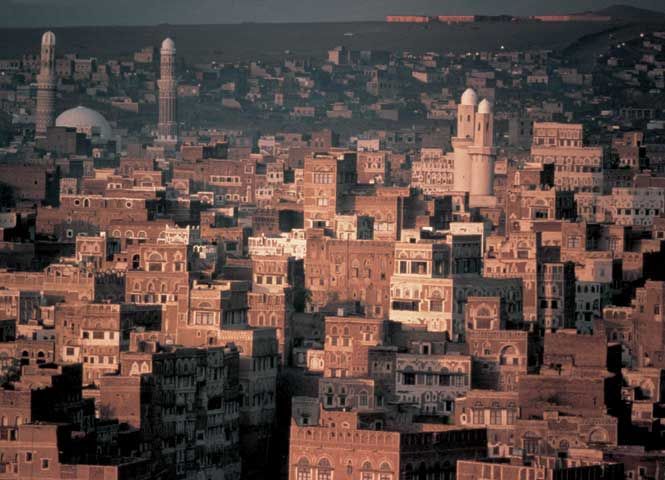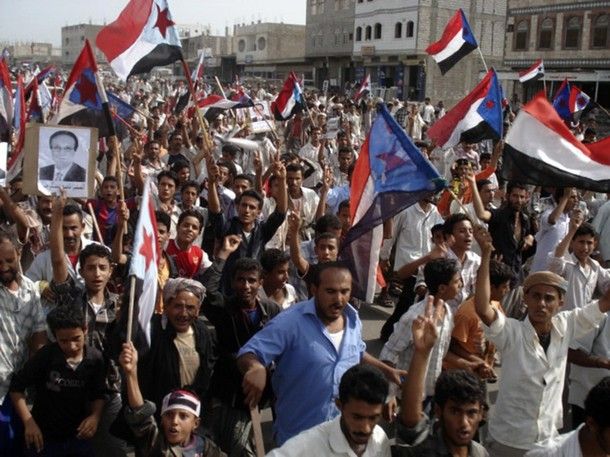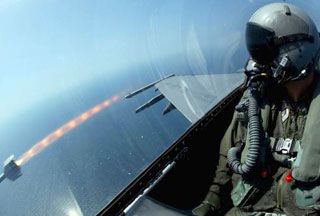It looks like you're using an Ad Blocker.
Please white-list or disable AboveTopSecret.com in your ad-blocking tool.
Thank you.
Some features of ATS will be disabled while you continue to use an ad-blocker.
share:
You might as well start reading about Yemen, now, because it looks like it's about to be on the forefront of everyone's mind.
This is the best place to start to get a clear picture of what seems to be happening:
Yemen on the Brink
Strategically located adjacent to both Saudi Arabia and Somalia, Yemen touches on a number of vital U.S. national security interests including access to energy supplies and the ongoing campaign against terrorism. Any single event—or more likely a confluence of worst-case events beyond the ability of the Yemeni government to control—could lead to a further erosion of central government authority in Yemen and destabilization of the region.
Nice set of circumstances, huh?
Take a gander at the headlines just from today:
Refugee camps in Yemen overwhelmed
Lingering conflict between government forces and al-Houthi rebels in Yemen is straining U.N. efforts to provide relief to the internally displaced community.
...
The U.N. refugee agency said at least one of its refugee camps exceeded its capacity as close to 100,000 displaced persons flee the violence.
...
The Yemeni government launched a scorched earth campaign in August against the Shiite rebel group. Escalations along the border with Saudi Arabia prompted Riyadh to join the fight against the rebels, while Iran faces accusations of supporting the Shiite insurgency.
International relief groups have raised repeated alarms over the potential humanitarian disaster that members of the displaced community in Yemen face.
Look at these other headlines, also mostly from today:
U.N.: Yemen's civil war spreads to Saudi Arabia
Somali Refugees Hired to Join Yemeni rebels
Yemeni navy captures vessel carrying arms
Saudi denies military entered Yemen: official
Iranian students stage protest before Saudi, Yemen embassies in Tehran
There are many more...
In fact, so many more, it was hard to decide which ones to place in this thread.
Take these, for example:
For Jews, roiling Yemen no longer place to call home
From Yemen, Anwar Awlaki Helped Inspire Fort Dix, Toronto Plots
Saudi Interior Minister Warns Against Hajj Violence
You start to get a clearer picture of the situation in Yemen...
Here is more disturbing analysis of the situation:
Rebellion in Yemen and the fateful quadrangle
Death by Proxy
And two related ATS threads:
Yemen hails military cooperation deal with US
Iran says it can help Yemen restore security
Can the situation in Yemen topple Saudi Arabia? Maybe. I'm sure that wont improve matters for the US...or oil prices...or the War on Terror...
Things are looking pretty grim, if you ask me.
Sooner or later, it looks like this situation will draw in the US.
Given our current problems in Iraq, Afghanistan, and even Pakistan, can we even do anything meaningful in Yemen????
On a closing note, I ran across this investment promo just released the other day. From the looks of it, it's a strikingly beautiful country.
Obviously, their timing couldn't be worse...
Yemen is a powder keg for the whole of the middle east. It's only a matter of time before a shoe drops.
[edit on 25-11-2009 by loam]
What I find interesting is that the Saudis are actually fighting.
Are they trying to gain experience, US over-committed, or just testing out their investment in new toys?
Are they trying to gain experience, US over-committed, or just testing out their investment in new toys?
reply to post by jam321
If any of what I read is true, they appear very worried.
Last month, there was an assassination attempt on the Saudi deputy interior minister, Prince Mohammed bin Nayef.
With the haj pilgrimage to Mecca starting today, they seem absolutely paranoid.
Speaking of paranoia, look at this from today in Yemen:
Things are staring to boil over...
If any of what I read is true, they appear very worried.
Last month, there was an assassination attempt on the Saudi deputy interior minister, Prince Mohammed bin Nayef.
With the haj pilgrimage to Mecca starting today, they seem absolutely paranoid.
Speaking of paranoia, look at this from today in Yemen:
Things are staring to boil over...
More from today's news:
Al-Qaida executes top Yemeni anti-terror officer: official
Yemenis protest against Iran for alleged support of rebels
Anti-Saudi Demonstrations In Iran, Anti-Iran Demonstrations In Yemen
Yemen shuts Iranian medical centers in Sana'a
Yemen Sees ‘Mounting Evidence’ Iran Is Arming Rebels
Al-Qaida executes top Yemeni anti-terror officer: official
Yemenis protest against Iran for alleged support of rebels
Anti-Saudi Demonstrations In Iran, Anti-Iran Demonstrations In Yemen
Yemen shuts Iranian medical centers in Sana'a
Yemen Sees ‘Mounting Evidence’ Iran Is Arming Rebels
SCENARIOS: How might Yemen's toxic mix of conflict develop?
Multiplying security and economic pressures are deepening instability in Yemen, raising fears for a strategically vital neighborhood that includes oil superpower Saudi Arabia and one of the world's busiest shipping lanes.
A Muslim Shi'ite revolt, southern secessionism and al Qaeda attacks have combined with water shortages, a humanitarian crisis, worsening poverty and falling oil income to stir powerful currents of turbulence in the poor Arabian country.
Concern has also focused on the proximity of failed Horn of Africa state Somalia, which sits across the Gulf of Aden and hosts a pirate community that preys on international shipping in defiance of an international flotilla that seeks to stop it.
Nearly 20,000 ships pass through the Gulf of Aden each year, heading to and from the Suez Canal.
"Yemen faces unprecedented challenges... Any one of these challenges coming to a crisis point could overwhelm the Yemeni government," Christopher Boucek, an associate in the Carnegie Middle East Program, said in a note to journalists this week.
If steps are not taken, "Yemen is at risk of becoming a failed state and a training ground for Islamist extremism."
Following are scenarios on how Yemen's problems may develop:
More...
Originally posted by jam321
What I find interesting is that the Saudis are actually fighting.
Are they trying to gain experience, US over-committed, or just testing out their investment in new toys?
Saudi Arabia likes to pretend that they have this perfect little country.. but the fact is, it's actually very volatile and fractured. There are many separatist groups, and large demographics that despise the ruling elite. The Oligarchy in Saudi Arabia is expansive, and their "toys" as you say are used mostly in preparation against their own people.
In Yemen, the fighting spilling into Saudi Arabia is more like a dangerous cancer .. terrorism and separatist fighting could easily break out if sparked by yemen.. it does not surprise me in the slightest to see Saudi trying to calm things with force inside Yemen.
Loam, that investment video was just weird .. I'd hope any major corporations did a background check on political stability and not just watch a video of pretty beaches and "culture"
reply to post by Rockpuck
Uh oh. You mean I shouldn't have invested in the camel farm?
You have to give 'em props for trying...
Originally posted by Rockpuck
Loam, that investment video was just weird .. I'd hope any major corporations did a background check on political stability and not just watch a video of pretty beaches and "culture"
Uh oh. You mean I shouldn't have invested in the camel farm?
You have to give 'em props for trying...
Some more news from the region.
Saudi Arabia goes to war
Opinion Piece: Saudi Arabia and Iran Face Off in Yemen
Inside Story - Foreign intervention in Yemen - 15 Nov 09
I agree with you loam, this region is about to get a whole lot worse.
Saudi Arabia goes to war
Opinion Piece: Saudi Arabia and Iran Face Off in Yemen
Inside Story - Foreign intervention in Yemen - 15 Nov 09
I agree with you loam, this region is about to get a whole lot worse.
Originally posted by jam321
What I find interesting is that the Saudis are actually fighting.
Are they trying to gain experience, US over-committed, or just testing out their investment in new toys?
The Saudi royals recognize the threat that is right on their border, and are acting accordingly.
But then again anyones guess is as good as mine..
Thought it was worth throwing this in your thread loam..
www.iraq-war.ru...
One of the posts has the following information:
www.iraq-war.ru...
By God's grace and support, a fighter plane was shot down yesterday evening (at Isha near Heyuan - Al-Imran). Meanwhile Saudis continued (14) air strikes yesterday (Razkk, Sabba, Mt Mudud, Mt Duknan, Mt Dhahr Al Humar). Intermittant rocket fire attacks contued in the evening, and Yemeni airforce conducted (3) attacks on (Sahar directorate)"
Houthi communique 8 Dec 2009
This is the second Yemeni MIG fighter downed by Houthis, and at least one Yemeni helicopter.
One of the posts has the following information:
(Report of four months fighting up to end of last week, therefore todays MIG not counted)
Total number of military vehicles captured or destroyed: (230)
Total number of aircraft downed (3) =1 MIG and 2 Sukhoi
Total number of military bases captured: (134)
Detailed spread sheets available here:
h ttp://sadahonline.org/ar/news/1-latest-news/497-2009-12-08-17-08-13.html
Petraeus on Yemen
General David Petraeus, who now heads the United States Central Command, gave an exclusive interview to Al Arabiya on Sunday where he discussed Washington's support of Yemen and Iraq and Syria's relationship.
The general stated that the U.S. is providing security support to Yemen within the framework of military cooperation provided by Washington to its allies in the region. He emphasized that the U.S. ships found in Yemen waters are not only there for monitoring but for also for hindering the flow of arms to Houthi rebels.
UPDATE:
Well, this is pretty amazing if true.
I'm off to look for confirmations...
'US fighter jets attack Yemeni fighters'
Yemen's Houthi fighters say the US fighter jets have launched 28 attacks on the northwestern province of Sa'ada.
The US has used modern fighter jets and bombers in its offensive against the Yemen fighters, Houthis said in a statement.
According to the statement, the US fighter jets have launched overnight attacks on the Yemeni fighters, Arabic Almenpar website reported.
More...
Well, this is pretty amazing if true.
I'm off to look for confirmations...
I worked with a woman from Yemen all summer and she wasn't happy to have to go back. This is an old issue and one that I agree, will become more
important as things (not-hopefully) deteriorate.
I'm keeping an eye on this, hoping for peace.
I'm keeping an eye on this, hoping for peace.
The escalation of US involvement seem to be clear:
See also: US special forces train Yemen army as Arab state becomes al-Qaeda 'reserve base'
US Dispatches Special Forces To Yemen Amid Crisis
US special forces have reportedly been sent to Yemen to train its army, as the Yemeni military backed by its Saudi counterpart battle local Houthi fighters in the coungtry's north.
See also: US special forces train Yemen army as Arab state becomes al-Qaeda 'reserve base'
28 attacks in Yemen by U.S. Aircraft ? mmm, doubtful.
U.S. Drones above Yemen? Possibly.
U.S. Special Forces in Yemen? Perhaps.
[edit on 12/14/09 by makeitso]
U.S. Drones above Yemen? Possibly.
the commander of U.S. Special Operations during his recent visit to Yemen two months ago, agreed with the Yemeni leaders under pressure to allow three U.S. spy planes to operate in Yemen from U.S. military bases in Djibouti, Ethiopia and the implementation of some special operations along the lines of what is happening in Pakistan and Somalia," adding that "These three planes were seen in the governorate of Marib
U.S. Special Forces in Yemen? Perhaps.
Fearful that Yemen is in danger of becoming a failed state, America has now sent a small number of special forces teams to improve training of Yemen's army in reaction to the threat.
[edit on 12/14/09 by makeitso]
reply to post by loam
I think it is pretty good idea to let the special forces train people. Yemen has been a terrorist haven for some time and maybe, just maybe we can help quell the place.
I only hope that the people the special forces are training won't use that training against us in the future.
I think it is pretty good idea to let the special forces train people. Yemen has been a terrorist haven for some time and maybe, just maybe we can help quell the place.
I only hope that the people the special forces are training won't use that training against us in the future.
Report: US helped Yemen's strike against al-Qaida
The U.S. provided firepower and other aid to Yemen in its strike this week against suspected al-Qaida hide-outs and training sites within its borders, the New York Times reported.
President Barack Obama approved the military and intelligence support, which came at the request of the Yemeni government.
...
See also:
U.S. Aids Yemeni Raids on Al Qaeda, Officials Say
...warships launching cruise missiles...
So it is true. The US is directly and officially involved in Yemen.
Add the Iranian invasion of the Iraqi oil site today and you have the makings of a significant escalation of things in the ME.
Not good.
The situation in YEMEN now makes TIME magazine:
Despite U.S. Help, Yemen Faces Growing Al-Qaeda Threat
With Yemen apparently on the verge of becoming the world's next failed state and a regional base for al-Qaeda, a series of U.S.-assisted air and ground assaults that shook pockets of Yemen last week might have seemed like a positive development in the troubled country's otherwise downward spiral. But the dramatic action, which appears to have resulted in a number of civilian casualties, may not right the situation at all. "The U.S. has been growing very concerned about al-Qaeda in recent years, but it seems as though the U.S. is coming rather late to the party," says Princeton University Yemen expert Gregory Johnsen, who contends last week's attacks would ultimately prove counterproductive.
Yemeni airstrike target top al Qaeda leaders
December 24, 2009 7:55 AM
The leader and the second in command of Al Qaeda in the Arabian Peninsula as well as a radical, Yemeni-American cleric who is said to have inspired the Ft. Hood massacre, are said to have been killed during an airstrike in Yemen today, according to Yemeni officials. The deaths have not been confirmed by the US.
The Yemeni Air Force targeted Nasir al Wuhayshi, the leader of al Qaeda in the Arabian Peninsula, and his deputy Said al Shihri, as they gathered for a high-level meeting of Al Qaeda in the Arabian Peninsula.
The terror group's top leaders were thought to have been gathering at the home of Anwar al Awlaki, the Yemeni-American cleric who provided religious justification for US Army Major Nidal Hasan to carry out a deadly shooting spree against US soldiers in Ft. Hood, Texas.
U.S. quietly takes terror war to Yemen
Covert front against al-Qaida was opened a year ago, military officers say
By ERIC SCHMITT and ROBERT F. WORTH
updated 12:38 a.m. ET Dec. 28, 2009
WASHINGTON - In the midst of two unfinished major wars, the United States has quietly opened a third, largely covert front against Al Qaeda in Yemen.
A year ago, the Central Intelligence Agency sent many field operatives with counterterrorism experience to the country, according a former top agency official. At the same time, some of the most secretive Special Operations commandos have begun training Yemeni security forces in counterterrorism tactics, senior military officers said.
The Pentagon is spending more than $70 million over the next 18 months, and using teams of Special Forces, to train and equip Yemeni military, Interior Ministry and coast guard forces, more than doubling previous military aid levels.
As American investigators sought to corroborate the claims of a 23-year-old Nigerian man that Qaeda leaders in Yemen had trained and equipped him to blow up a Detroit-bound Northwest Airlines jet on Christmas Day, the plot casts a spotlight on the Obama administration’s complicated relationship with Yemen.
Refuge for jihadists
The country has long been a refuge for jihadists, in part because Yemen’s government welcomed returning Islamist fighters who had fought in Afghanistan during the 1980s. The Yemen port of Aden was the site of the audacious bombing of the American destroyer Cole in October 2000 by Qaeda militants, which killed 17 sailors.
But Qaeda militants have made much more focused efforts to build a base in Yemen in recent years, drawing recruits from throughout the region and mounting more frequent attacks on foreign embassies and other targets. The White House is seeking to nurture enduring ties with the government of President Ali Abdullah Saleh and prod him to combat the local Qaeda affiliate, Al Qaeda in the Arabian Peninsula, even as his impoverished country grapples with seemingly intractable internal turmoil.
With fears also growing of a resurgent Islamist extremism in nearby Somalia and East Africa, administration officials and American lawmakers said Yemen could become Al Qaeda’s next operational and training hub, rivaling the lawless tribal areas of Pakistan where the organization’s top leaders operate.
“Yemen now becomes one of the centers of that fight,” said Senator Joseph I. Lieberman, independent of Connecticut and chairman of the Homeland Security and Governmental Affairs Committee, who visited the country in August. “We have a growing presence there, and we have to, of Special Operations, Green Berets, intelligence,” he said on “Fox News Sunday.”
Pivotal point
American and Yemeni officials said that a pivotal point in the relationship was reached in late summer after separate secret visits to Yemen by Gen. David H. Petraeus, the American regional commander, and John O. Brennan, President Obama’s counterterrorism adviser.
President Saleh agreed to expanded overt and covert assistance in response to growing pressure from the United States and Yemen’s neighbors, notably Saudi Arabia, from which many Qaeda operatives had fled to Yemen, as well as a rising threat against the country’s political inner circle, the officials said.
“Yemen’s security problems won’t just stay in Yemen,” said Christopher Boucek, who studies Yemen as an associate at the Carnegie Endowment for International Peace in Washington. “They’re regional problems and they affect Western interests.”
Al Qaeda’s profile in Yemen rose sharply a year ago, when a former Guantánamo Bay detainee from Saudi Arabia, Said Ali al-Shihri, fled to Yemen to join Al Qaeda and appeared in a video posted online. Several other former Guantánamo detainees have also joined the group.
Yemen’s remote areas are notoriously lawless, but the country’s chaos has worsened in the past two years, as the government struggles with an armed rebellion in the northwest and a rising secessionist movement in the south. Yemen is running out of oil, and the government’s dwindling finances have affected its ability to strike Al Qaeda.
Ties to plots against U.S.
Meanwhile, there have been increasing Yemeni ties to plots against the United States. A Muslim man charged in the June 1 killing of a soldier at a recruiting center in a mall in Little Rock, Ark., had traveled to Yemen, prompting a review by the F.B.I. of other domestic extremists who had visited the country.
A radical cleric in Yemen, Anwar al-Awlaki, has been linked to numerous terrorism suspects, including Nidal Malik Hasan, the American Army major who faces murder charges in the shooting deaths of 13 people at Fort Hood, Tex., in November.
In the latest issue of Sada al-Malahim, the Internet magazine of the Qaeda affiliate in Yemen, the group’s leader, Nasser al-Wuhayshi, praised the use of small bombs — not just big ones — to attack an enemy, in an eerie foreshadowing of Friday’s episode on the plane to Detroit.
Yemen escalated its campaign against Al Qaeda with major airstrikes on Dec. 17 and last Thursday that killed more than 60 militants.
American officials have been coy about the role of the United States in the strikes, saying that they have provided intelligence and “firepower” for the efforts.
Yemen’s foreign minister, Abu Bakr al-Qirbi, said Sunday that Yemeni military cooperation with the United States and Saudi Arabia had increased in recent months as fresh intelligence confirmed Al Qaeda’s greater assertiveness in the country.
www.msnbc.msn.com...
well, nothing new for military industrial complex to spread conflicts, they need money and to look like they are winning the 'war on terror',
but they are not...
but they are not...
new topics
-
My personal experiences and understanding of orbs
Aliens and UFOs: 8 hours ago -
Matt Gaetz ready to go global thermonuclear
US Political Madness: 9 hours ago -
Research paper about plasmoids specifically calls out missing MH370 flight
General Conspiracies: 10 hours ago -
NJ Drones just another Psy-Op
Dissecting Disinformation: 11 hours ago
top topics
-
Matt Gaetz ready to go global thermonuclear
US Political Madness: 9 hours ago, 14 flags -
Covid....... Again.
Diseases and Pandemics: 16 hours ago, 13 flags -
Smartest Man in the World Tells His Theory About What Happens At Death
Philosophy and Metaphysics: 14 hours ago, 11 flags -
US Federal Funding set to Expire December 20th. Massive CR on the way.
Mainstream News: 16 hours ago, 8 flags -
NJ Drones just another Psy-Op
Dissecting Disinformation: 11 hours ago, 4 flags -
My personal experiences and understanding of orbs
Aliens and UFOs: 8 hours ago, 4 flags -
Research paper about plasmoids specifically calls out missing MH370 flight
General Conspiracies: 10 hours ago, 3 flags
active topics
-
The Mystery Drones and Government Lies --- Master Thread
Political Conspiracies • 132 • : network dude -
Smartest Man in the World Tells His Theory About What Happens At Death
Philosophy and Metaphysics • 25 • : andy06shake -
My personal experiences and understanding of orbs
Aliens and UFOs • 8 • : Hecate666 -
Covid....... Again.
Diseases and Pandemics • 26 • : Euronymous2625 -
Defending the need for adherence to Old Testament commandments under the new covenant of Christ
Conspiracies in Religions • 52 • : ADVISOR -
Russias War Against Religion in Ukraine
World War Three • 35 • : Freeborn -
The truth lets admit it
Aliens and UFOs • 68 • : Naftalin -
-@TH3WH17ERABB17- -Q- ---TIME TO SHOW THE WORLD--- -Part- --44--
Dissecting Disinformation • 3753 • : brewtiger123 -
Trump Cancel trip to New Jersey because of drones
Aliens and UFOs • 77 • : WeMustCare -
Post A Funny (T&C Friendly) Pic Part IV: The LOL awakens!
General Chit Chat • 7923 • : KrustyKrab




